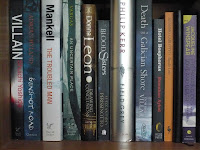
 The body of a fisherman, Juan Castelo, known as El Rubio, is washed up on the beach at Panxon. His hands have been tied in a way that made it unlikely that he had committed suicide. Taciturn Galician Detective Inspector Leo Caldas, and his fiery Aragonese assistant Rafa Estevez begin a slow methodical investigation that involves looking into the loss of a fishing vessel, the Xurelo, over a decade earlier. Three young fisherman including El Rubio had swum to safety, but the elderly Captain Antonio Sousa had gone down with his boat, and his body was recovered later in a trawler's net. But the superstitious locals believe they have seen Captain Sousa near the harbour.
The body of a fisherman, Juan Castelo, known as El Rubio, is washed up on the beach at Panxon. His hands have been tied in a way that made it unlikely that he had committed suicide. Taciturn Galician Detective Inspector Leo Caldas, and his fiery Aragonese assistant Rafa Estevez begin a slow methodical investigation that involves looking into the loss of a fishing vessel, the Xurelo, over a decade earlier. Three young fisherman including El Rubio had swum to safety, but the elderly Captain Antonio Sousa had gone down with his boat, and his body was recovered later in a trawler's net. But the superstitious locals believe they have seen Captain Sousa near the harbour.
Death on a Galician Shore was translated from the Spanish by Sonia Soto, and is the second book by Domingo Villar that features Inspector Leo Caldas. This novel won the 2009 Brigada 21 Prize for best crime novel in Spain, following up on the success of Water-Blue Eyes which won of the Brigada 21 Prize for best first crime novel, and the Sintagma prize.
This crime novel is a straightforward police procedural in which Leo Caldas, questions witnesses and suspects, and gradually with a little luck solves the case. As would be expected there are a few twists and turns along a trail scattered with false clues.
The questioning and re-questioning of suspects is a little repetitive, but it is definitely not only the criminal investigation that makes this book such a great read. The descriptions of Galicia and the subtle interplay between the characters take the reader right into the action. You can almost smell the plates of seafood, or the salty sea breeze and feel the rain in your face blowing in off the Atlantic.
When he went to university, his father left his job in Vigo and moved permanently to his wife's old family home, which he had gradually restored.
The land, initially providing comfort in his time of affliction, was now a profitable business, and the nights of weeping were no more than a shadow in the memory.
Wine, the downfall of so many men, had been his salvation.
Throughout the book Caldas and his relationships with his father, Uncle Alberto, Estevez, Alba, the woman who left him, and retired Doctor Trabazo play a key role in creating atmosphere in this beautifully written novel.
There are scenes set in the hospital between Leo, his father and Uncle Alberto which are both witty and bittersweet; so when the doctor tells Alberto he will be as good as new in a month, he asks:
'Have you still got your Book of Idiots?'
............
'Well, add that doctor to it,' he said, pointing feebly at the door through which the doctor had departed.
The differing attitudes to suspects, and to life, of the lonely laconic Leo Caldas and the rumbustious Rafa Estevez, from Zaragoza, add a little spice of humour to the story.
'You know I'm not keen on dead people, Inspector,' said Estevez a little sheepishly.
'And the living aren't too keen on you,' murmured Caldas,........
There is also humour involved in Leo's performances on the local Vigo radio station as he struggles to improve community relations by answering questions on 'his program' Patrolling the Waves despite the various distractions.
I really enjoyed reading Death on a Galician Shore despite the fact there were no pyrotechnics just a straightforward story told with skill, and a lot of empathy for the characters.
A successful European crime fiction series that is neither Nordic, Italian or French, would be a bit special.
Leg of veal, boned and chopped small, was simmered over a low heat all morning together with onions,leeks, carrots and seasoning. After about three hours on the hob, the chick peas were added and, at the very end a sofrito of onions, garlic and paprika.















 Update: This blog is now dormant and I have moved to Crime Scraps Review, where you can read all the old posts and lots of new material.
Update: This blog is now dormant and I have moved to Crime Scraps Review, where you can read all the old posts and lots of new material.



